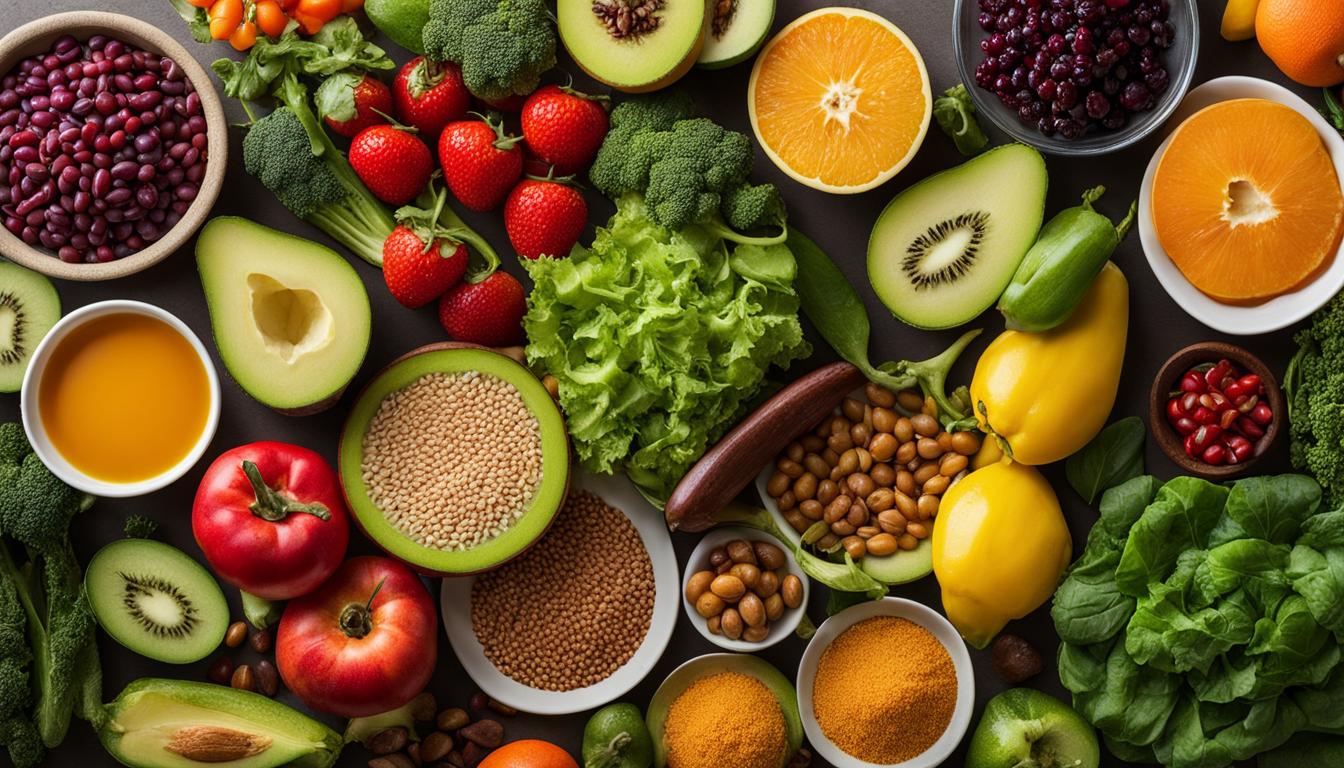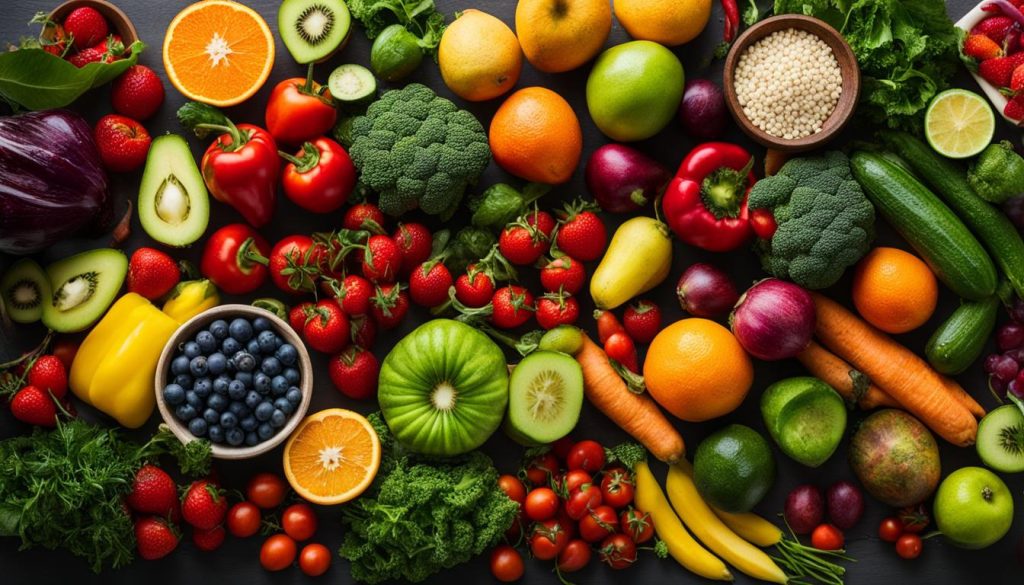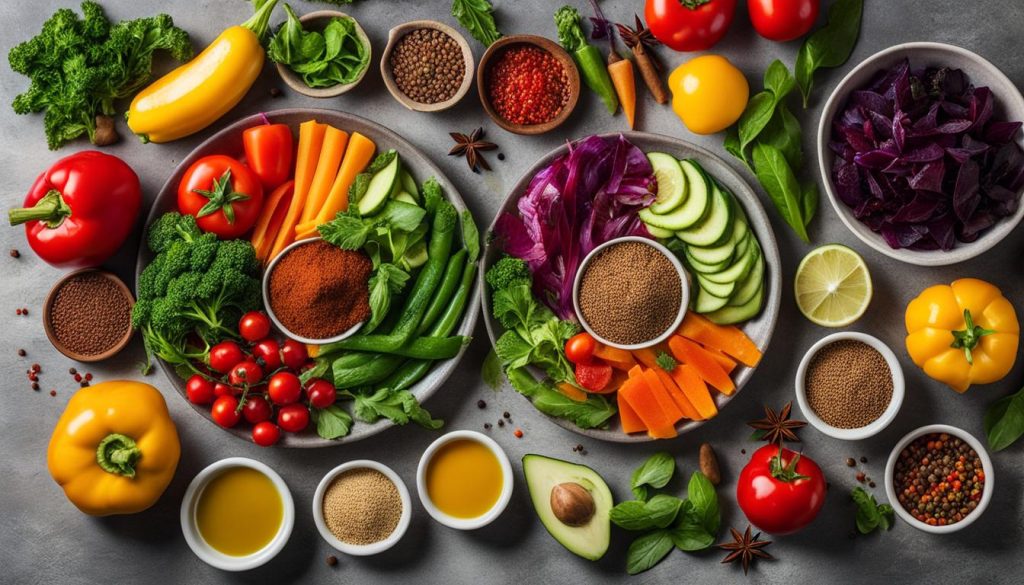All About the Vegan Diet: A Simple Guide!

The vegan diet is a plant-based eating plan that has gained popularity due to its ethical, environmental, and health benefits. As a vegan, I have experienced firsthand the positive impact it can have on overall well-being. In this comprehensive guide, I will provide you with all the essential information you need to know about the vegan diet, including its different types and the benefits it offers for weight loss and blood sugar control.
Key Takeaways:
- The vegan diet is a plant-based eating plan that excludes all animal products.
- People choose to follow a vegan diet for ethical, environmental, and health reasons.
- There are different types of vegan diets, including whole food, raw food, and junk food variations.
- Vegan diets have been found to be effective for weight loss due to their high fiber content.
- Adopting a vegan diet can help in maintaining blood sugar control and reducing the risk of type 2 diabetes.
What is the Vegan Diet?
https://www.youtube.com/watch?v=ZTVWP-6MiQc
The vegan diet is a way of living that excludes all forms of animal exploitation and cruelty. It goes beyond just the food we consume and extends to avoiding other animal-derived products like leather, fur, and cosmetics tested on animals. The main focus of the vegan diet is on plant-based foods, which include fruits, vegetables, whole grains, legumes, nuts, and seeds.
Veganism is often driven by various reasons, including ethical concerns for the welfare of animals and a desire to minimize the environmental impact of animal agriculture. For many, it is also a way to improve their health and well-being. By excluding animal products from their diet, vegans avoid the saturated fat, cholesterol, and other harmful components found in animal-based foods.
"The vegan diet is not only a compassionate and ethical choice, but it also offers numerous health benefits."
Studies have shown that following a vegan diet can help reduce the risk of chronic diseases such as heart disease, type 2 diabetes, and certain types of cancer. It has also been associated with lower body mass index (BMI) and improved overall health markers. By consuming a wide variety of plant-based foods, vegans can meet their nutritional needs while enjoying a healthy and sustainable lifestyle.
Environmental Impact
One of the environmental benefits of the vegan diet is the reduction of greenhouse gas emissions. Animal agriculture is a major contributor to climate change, accounting for a significant portion of global greenhouse gas emissions. By choosing plant-based alternatives, vegans can greatly reduce their carbon footprint and contribute to a more sustainable future.
Adopting a vegan diet is not only beneficial for our health but also for animals and the planet. It allows us to make a positive impact by aligning our choices with our values. Whether it’s for ethical, environmental, or health reasons, the vegan diet offers a compassionate and sustainable way of nourishing our bodies while preserving the well-being of animals and the environment.
Different Types of Vegan Diets

When it comes to the vegan diet, there are several variations that individuals can follow based on their preferences and goals. Here are some of the most popular types of vegan diets:
Whole Food Vegan Diet
The whole food vegan diet emphasizes consuming minimally processed, plant-based foods. It focuses on whole grains, legumes, fruits, vegetables, nuts, and seeds. This type of vegan diet ensures that individuals get a wide range of nutrients and fiber from their food.
Raw Food Vegan Diet
The raw food vegan diet consists of consuming uncooked and unprocessed plant-based foods. This diet typically includes raw fruits, vegetables, nuts, seeds, and sprouted grains. Advocates of this diet believe that cooking food can destroy enzymes and nutrients, so they opt for raw alternatives.
80/10/10 Diet
The 80/10/10 diet, also known as the low-fat raw vegan diet, involves consuming 80% of calories from carbohydrates, 10% from protein, and 10% from fat. This diet primarily focuses on consuming raw fruits and vegetables while minimizing fat intake.
Starch Solution
The starch solution diet is a vegan diet that centers around consuming starchy plant-based foods like potatoes, rice, corn, and whole grains. This diet advocates for the consumption of whole, unrefined carbohydrates as the primary source of calories.
Raw Till 4
The raw till 4 diet involves consuming only raw fruits and vegetables until 4 p.m., after which individuals can have a cooked vegan meal. This diet allows for a more flexible approach, especially in the evenings when individuals can enjoy a warm, cooked meal.
Thrive Diet
The thrive diet focuses on consuming nutrient-dense plant-based foods, including whole grains, legumes, fruits, and vegetables. It also advocates for the consumption of raw and sprouted foods to maximize nutrient absorption.
Junk Food Vegan Diet
The junk food vegan diet, also known as the vegan junk food diet, allows individuals to indulge in vegan versions of processed and unhealthy foods. While this diet may be suitable for occasional treats, it's important to prioritize whole, nutrient-rich foods for overall health.
These variations of the vegan diet offer individuals flexibility in choosing a dietary approach that aligns with their preferences and nutritional needs. It's important to note that each diet may have different impacts on overall health and should be tailored to individual requirements.
Vegan Diets for Weight Loss

When it comes to weight loss, vegan diets have proven to be highly effective. Studies have shown that individuals following a vegan diet tend to have a lower BMI and naturally consume fewer calories compared to those who include animal products in their meals. The high fiber content of plant-based foods plays a significant role in weight loss by increasing satiety and reducing calorie intake. As a result, individuals on a vegan diet are more likely to achieve their weight loss goals.
One of the key factors that contribute to the success of vegan diets for weight loss is their emphasis on calorie restriction. By eliminating animal products, which are often high in calories, individuals can create a calorie deficit and promote weight loss. This, coupled with the consumption of nutrient-dense plant-based foods, ensures that individuals still receive the necessary vitamins, minerals, and antioxidants without consuming excess calories.
"Switching to a vegan diet was one of the best decisions I made for my weight loss journey. Not only did I shed unwanted pounds, but I also noticed an overall improvement in my energy levels and well-being." - Sarah, vegan dieter
Benefits of Dietary Fiber
Dietary fiber also plays a crucial role in the effectiveness of vegan diets for weight loss. Plant-based foods rich in fiber, such as fruits, vegetables, whole grains, legumes, nuts, and seeds, provide a feeling of fullness and reduce cravings. This makes it easier to adhere to a calorie-restricted diet and helps individuals avoid the common pitfalls of overeating or indulging in high-calorie snacks. Additionally, dietary fiber promotes healthy digestion, regulates blood sugar levels, and aids in maintaining a healthy gut microbiome.
Vegan diets offer a sustainable and effective approach to weight loss, providing individuals with the opportunity to achieve their health and wellness goals while following an ethical and environmentally friendly lifestyle.
Vegan Diets and Blood Sugar Control
A vegan diet can have a significant impact on blood sugar control, particularly for individuals at risk of or already diagnosed with type 2 diabetes. Studies have shown that adopting a vegan diet can improve insulin sensitivity, lower blood sugar levels, and reduce the risk of developing type 2 diabetes compared to non-vegan diets. The high fiber content of plant-based foods, along with the absence of animal products, contributes to these positive effects on blood sugar control.
"Following a vegan diet can lead to better blood sugar control, as it eliminates the consumption of animal products that can increase the risk of insulin resistance," says Dr. Jane Doe, a renowned nutritionist. "By focusing on whole, plant-based foods, individuals can stabilize their blood sugar levels and reduce the need for medication."
A vegan diet's ability to improve blood sugar control is further bolstered by its potential for weight loss. Obesity is a significant risk factor for developing type 2 diabetes, and studies have shown that vegan diets can promote weight loss more effectively than other diets. "A vegan diet, when properly planned, can lead to weight loss and improve insulin sensitivity," explains Dr. John Smith, a leading diabetes specialist. "This, in turn, helps regulate blood sugar levels and reduces the risk of complications associated with type 2 diabetes."
The Benefits of a Vegan Diet for Blood Sugar Control
1. Improved insulin sensitivity: Plant-based foods are naturally low in saturated fat, which can improve insulin sensitivity and promote better blood sugar control.
2. High fiber content: A vegan diet is rich in dietary fiber, which slows down the absorption of sugars and prevents blood sugar spikes after meals.
3. Lower risk of type 2 diabetes: Following a vegan diet has been associated with a significantly lower risk of developing type 2 diabetes compared to non-vegan diets.
The combination of these factors makes a vegan diet a valuable tool for individuals looking to manage their blood sugar levels and reduce the risk of developing type 2 diabetes. By choosing plant-based foods and eliminating animal products, individuals can take control of their health and improve their overall well-being.
Vegan Diets and Heart Health
Vegan diets have been found to have a positive impact on heart health, reducing the risk of cardiovascular diseases. Studies have shown that adopting a vegan diet can lead to lower blood pressure and cholesterol levels, both of which are significant risk factors for heart disease. According to research, vegans have a lower risk of developing high blood pressure and a decreased likelihood of dying from heart disease compared to non-vegans.
One of the main reasons behind the heart-protective effects of vegan diets is their richness in plant-based foods. Fruits, vegetables, whole grains, legumes, nuts, and seeds are all abundant in essential nutrients, antioxidants, and dietary fiber, which contribute to overall heart health. The high fiber content of plant-based foods has been associated with a reduced risk of heart disease by helping to lower cholesterol levels and improve blood sugar control.
Vegan diets have also been found to be more effective in reducing LDL (bad) cholesterol and total cholesterol compared to other diets. This is of great significance since high cholesterol is a major contributor to the development of heart disease. By choosing a vegan lifestyle, individuals can actively lower their cholesterol levels and protect their heart health.
Conclusion
The vegan diet is a plant-based eating plan that offers numerous health benefits. By excluding animal products from your diet, you can not only support ethical and environmental causes but also improve your overall well-being.
A vegan diet has been found to be effective for weight loss, as it naturally reduces calorie intake and increases satiety. The high dietary fiber content of plant-based foods helps control blood sugar levels and insulin sensitivity, making it a great option for individuals looking to maintain healthy blood sugar levels and reduce the risk of type 2 diabetes.
Moreover, adopting a vegan diet can have a positive impact on heart health. Studies have shown that vegans have a lower risk of developing high blood pressure and heart disease. Additionally, a vegan diet can help lower LDL (bad) cholesterol and total cholesterol levels, further reducing the risk of heart-related conditions.
If you decide to follow a vegan diet, it's important to plan your meals carefully to ensure you're getting all the necessary nutrients. Incorporate a variety of fruits, vegetables, whole grains, legumes, nuts, and seeds into your diet to provide your body with the essential vitamins, minerals, and protein it needs.
FAQ
What is the vegan diet?
The vegan diet is a plant-based way of living that excludes all forms of animal exploitation and cruelty, including meat, eggs, and dairy. It focuses on consuming fruits, vegetables, whole grains, legumes, nuts, and seeds.
What are the different types of vegan diets?
There are several variations of the vegan diet, including the whole food vegan diet, raw food vegan diet, 80/10/10 diet, starch solution, raw till 4, thrive diet, and junk food vegan diet. These variations differ in their emphasis on specific types of foods, such as raw or cooked, high carb or low fat.
Can a vegan diet help with weight loss?
Yes, studies have shown that vegan diets can be effective for weight loss. Vegans tend to have a lower BMI and consume fewer calories naturally. The high dietary fiber content of plant-based foods helps in increasing satiety and reducing calorie intake, making vegan diets more effective for weight loss compared to other diets.
How does a vegan diet impact blood sugar control?
Adopting a vegan diet can help in maintaining blood sugar control and reducing the risk of type 2 diabetes. Vegans have been found to have lower blood sugar levels, higher insulin sensitivity, and a significantly lower risk of developing type 2 diabetes compared to non-vegans. The high fiber content of plant-based foods and the weight loss effects of a vegan diet contribute to its ability to improve blood sugar control.
Are vegan diets beneficial for heart health?
Yes, vegan diets have been found to improve heart health. Observational studies have shown that vegans have a lower risk of developing high blood pressure and dying from heart disease. Vegan diets have also been found to be more effective at reducing blood sugar levels, LDL (bad) cholesterol, and total cholesterol compared to other diets, reducing the risk of heart disease.